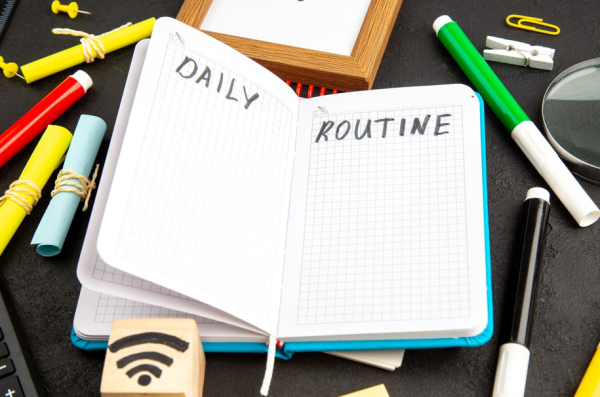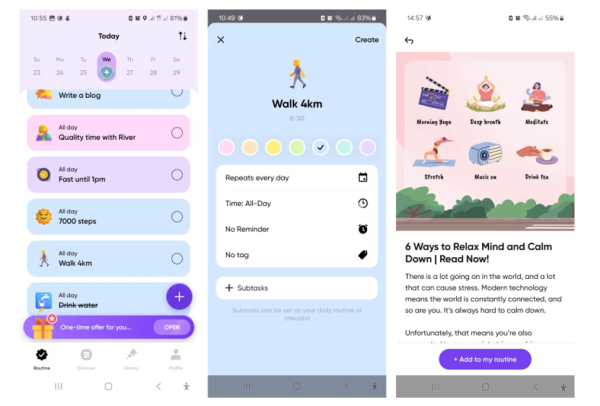
Building routines often starts with the best intentions. You set goals, mark your calendar, and perhaps even get inspired by Andrew Huberman’s routine.
But then, life throws you a curveball. Maybe it’s a new job, a move, or even unexpected life events. The challenge: How do you stick with your habits despite these changes?
Read on as we explore practical ways to maintain your routines regardless of life’s unpredictability.
Identifying Core Habits That Matter Most
When navigating through life’s changes, it becomes crucial to understand which habits truly make a difference and why they matter to you.
Know Your ‘Why’
First off, it’s essential to understand why you adopted specific habits in the first place. Your motivation is the engine that fuels persistence.
Are you exercising for better health, or is it because you enjoy it? Knowing what drives you helps anchor your habits.
Various studies show that intrinsic motivation – doing something because it’s inherently meaningful to you – plays a crucial role in maintaining long-term habits.
Prioritize Key Habits
Not all habits are created equal. Some have more impact on your overall well-being than others.
For example, daily exercise and adequate sleep usually rank pretty high on the list of beneficial habits.
Create a hierarchy of habits based on their significance in your life. When push comes to shove, this can help you focus on what’s most important.
Strategies to Adapt Your Routine During Change
Adaptable strategies help maintain consistency in your routines when encountering life’s inevitable changes. Take a closer look at a few strategies below:
Be Flexible
Flexibility enables your habits to evolve alongside your changing circumstances.
Consider “habit stacking” – linking new practices to existing ones. If you’ve just moved to a new city, for instance, finding a local gym could become intertwined with exploring your neighborhood.
Modify But Don’t Ditch
Sometimes, completely sticking to an old routine is impossible. Instead of throwing in the towel, modify your habits to fit new environments.
If you used to run outdoors but now live in a city without green spaces, consider treadmill running or gym workouts.
Use Technology Wisely
We live in an age where technology can significantly aid habit formation and maintenance.
- Habit-tracking apps can send reminders and offer visual progress reports.
- Tools like meditation apps make it easier to incorporate mental wellness into your schedule despite time constraints.

Hedging Against Failure: Preparing for Slips Without Self-Sabotage
When it comes to maintaining habits, expecting occasional lapses and preparing for them can make a world of difference.
Expect Imperfection
One major pitfall people encounter is the unrealistic expectation of perfection. Everyone slips up now and then, and that’s okay.
The key is resilience – getting back on track as soon as possible instead of letting one setback spiral into abandoning a habit entirely.
Plan B – Always Have One
Setting up a backup plan is vital when establishing routines during unpredictable times.
If you usually do morning yoga but find yourself pressed for time, have a shorter session ready that you can do later in the day. This minimizes disruption while ensuring you still get some form of practice.
Celebrate Small Wins
Acknowledging incremental progress can boost morale and motivation. Whether it’s an extra five minutes of meditation or an additional set of exercises completed, celebrate these small wins as they accumulate to produce significant results over time.
Final Thoughts
Maintaining routines through life’s ups and downs requires flexibility, support, and a strong understanding of why certain habits matter so much to you.
By preparing for change and adopting adaptive strategies, you can ensure that life’s unpredictability won’t derail your progress.
Frequently Asked Questions (FAQs)
How do I identify which habits are worth keeping during significant life changes?
Focus on habits that align closely with your core values and long-term goals. These tend to offer the most significant benefits and warrant prioritization even during turbulent times.
Can technology really help me maintain my habits?
Yes. Tools such as habit-tracking apps and digital planners can provide daily reminders and visual progress reports, making it easier to stay committed even if other aspects of your life are chaotic.
What if my environment drastically changes, leaving me without access to the resources needed for my routine?
Adaptability is key. Modify your habits to fit new circumstances rather than abandoning them altogether. Research alternative methods or locations that facilitate the continuation of similar activities.
Is it worth seeking professional help for habit maintenance?
Yes, especially if you’re struggling or going through major life transitions. Professional guidance can provide specialized strategies tailored to your needs, helping you navigate challenges more effectively.
How should I handle setbacks without feeling like I’ve failed completely?
Recognize that setbacks are part of the journey towards creating lasting habits. Develop a resilient mindset by picking yourself up quickly after slips and celebrating minor achievements along the way.

